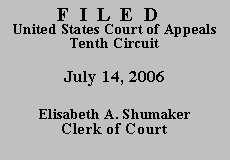

| DAGOBERTO IBARRA,
Petitioner, v. ALBERTO R. GONZALES, Attorney General, Respondent. |
|
Mr. Ibarra has an extensive history of entering illegally and being expelled from the United States. As is relevant to this appeal, he was deported on June 23, 1978. He reentered illegally a month later, was imprisoned for 179 days, and was allowed to return to Mexico under voluntary departure with safeguards in January 1979. Mr. Ibarra reentered at least twice more, in 1979 and 1980. The record is not clear, but it appears that on each occasion he was afforded voluntary departure upon serving prison time for illegal reentry. After his 1980 imprisonment, Mr. Ibarra apparently remained in Mexico until May 28, 1999, when he again illegally entered this country.
Mr. Ibarra sought to legalize his status by filing an application for adjustment of status and a I-212 application for permission to reapply for admission into the United States. Adjustment of status was denied on the ground that Mr. Ibarra was subject to reinstatement of the 1978 deportation order. The government then reinstated the 1978 deportation order and ordered Mr. Ibarra removed.
Section 1231(a)(5) provides:
If the Attorney General finds that an alien has reentered the United States illegally after having been removed or having departed voluntarily, under an order of removal, the prior order of removal is reinstated from its original date and is not subject to being reopened or reviewed, the alien is not eligible and may not apply for any relief under this chapter, and the alien shall be removed under the prior order at any time after the reentry.
Mr. Ibarra does not contest any of the three conditions for reinstating a deportation order. See Duran-Hernandez, 348 F.3d at 1162-63 (removal order may be reinstated upon showing that alien (1) was subject to prior removal order, (2) is the same alien who was removed, and (3) illegally reentered this country). Instead, he argues that § 1231(a)(5) is not applicable to him because his most recent departures from this country were voluntary departures rather than deportations. This issue is one of statutory construction, so it is reviewed de novo. Robbins v. Chronister, 435 F.3d 1238, 1240 (10th Cir. 2006) (en banc).
Section 1231(a)(5) applies to aliens who reenter after (1) having been removed, or (2) having departed voluntarily, under an order of removal. Mr. Ibarra essentially contends that the statute applies only to the alien's most recent departure. He distinguishes his voluntary departures from self-removal, suggesting that § 1231(a)(5) "appl[ies] only to individuals whose departures would be considered pursuant to an order of removal rather than those whose departures would be considered under a grant of voluntary departure." Aplt. Br. at 14.
We disagree. Mr. Ibarra is an alien who reentered this country illegally after having been deported, and therefore § 1231(a)(5) plainly applies to him. Mr. Ibarra does not cite, and we have not found, any authority indicating that his subsequent departures vitiated the 1978 deportation order. Because Mr. Ibarra falls under the first category of aliens subject to reinstatement under § 1231(a)(5), we need not analyze whether his voluntary departures are distinguishable from a situation in which an alien "departed voluntarily, under an order of removal."
Mr. Ibarra generally concedes that applying § 1231(a)(5) to him is not impermissibly retroactive. See Fernandez-Vargas v. Gonzales, No. 04-1376, __ S. Ct. __, 2006 WL 1698970, at *8-9 (U.S. June 22, 2006) (§ 1231(a)(5) is not impermissibly retroactive even when an alien reentered the United States before the statute's effective date). But he sets forth an alternate due process argument that, because his extended absence from the United States would satisfy the 10-year-absence requirement for admissibility under INA § 212(a)(9)(C), 8 U.S.C. § 1182(a)(9)(C), applying § 1231(a)(5) to him would unconstitutionally deny him the benefits of the voluntary departures and impose on him "the disabilities associated with an order of deportation." Aplt. Br. at 25. Again, however, his subsequent voluntary departures did not negate his 1978 order of deportation or otherwise relieve Mr. Ibarra of any disabilities associated with it. Applying § 1231(a)(5) to Mr. Ibarra is not impermissibly retroactive or otherwise a violation of due process.
Finally, Mr. Ibarra argues that he is admissible because he stayed out of the United States for more than the 10 years required by § 1182(a)(9)(C)(ii). But this provision requires an alien to obtain the Attorney General's permission to return before the alien attempts to enter this country, and Mr. Ibarra did not seek such permission. In any event, the reinstatement of the deportation order under § 1231(a)(5) renders Mr. Ibarra ineligible for adjustment of status or I-212 relief. See 8 U.S.C. § 1231(a)(5); Berrum-Garcia v. Comfort, 390 F.3d 1158, 1163 (10th Cir. 2004).
This court's stay orders dated October 26, 2005, and November 30, 2005, are VACATED, and the petition for review is DENIED.
Entered for the Court
Circuit Judge
*. After examining the briefs and appellate record, this panel has determined unanimously that oral argument would not materially assist the determination of this appeal. See Fed. R. App. P. 34(a)(2); 10th Cir. R. 34.1(G). The case is therefore ordered submitted without oral argument. This order and judgment is not binding precedent, except under the doctrines of law of the case, res judicata, and collateral estoppel. The court generally disfavors the citation of orders and judgments; nevertheless, an order and judgment may be cited under the terms and conditions of 10th Cir. R. 36.3.